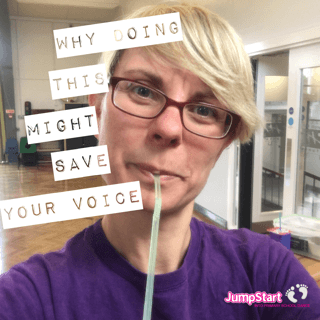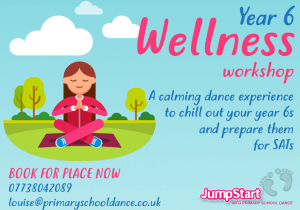If you've read the AfPE guidelines (or our recent blog about it here) you will…

Why doing this might save your voice…
Welcome back to a new academic year!
Having time off over the summer provides opportunity to reflect on the year just gone and consider improvements for the forthcoming one. For me, there have been lots of positives to celebrate (a brilliant dance festival, lots of successful projects) as well as areas for development (time management). The priority this year though, will be on taking better care of myself whilst at work. Hence the straw (more on that later).
So with that in mind, I have been looking at how to improve the way I manage my own physical and mental health. One thing that’s really struck me is how often I suffer with a sore throat and hoarse voice – so much so that sometimes I struggle to speak. Which is not very conducive for a teacher.
Reading into the issue, it seems I’m not alone. According to the NUT ‘teachers are eight times more likely to suffer from voice-related health conditions than other professions. Newly-qualified teachers are at even greater risk, with 50 per cent of NQTs suffering voice loss.’ Factors such as shouting, whispering, reading aloud stories over-enthusiastically and, for me especially, speaking over music, all impact on our vocal health.
What can be done to protect our voices and ensure we can still be heard at the end of each day? There are exercises that teachers can use to support our vocal chords and mitigate the impact of our jobs. I’ve been trying some of them out this week with some real successes. After teaching 3 sessions back to back this afternoon with some lively year 1s, I’ve noticed my voice isn’t as strained as usual, I’m clearing my throat less and I’m generally more aware of how I’m speaking.
Here’s some exercises you might want to try out yourself…
- Warm up your facial muscles. Say something to yourself, exaggerating the words. A good one is: ‘the lips, the teeth, the tip of the tongue’. Take the time to use those parts of your face whilst saying the sentence. You could also give your face, including your jaw which can get tense and tight, a good rub.
- Warm up your vocal chords. Start gently and softly. Repeat a tongue twister. Once you’ve done this several times, try it out with different pitches (higher or lower) or with different accents. Stay within your normal vocal range to avoid straining your voice.
- Sing along to a good tune. Love a bit of The Greatest Showman? Or is Meatloaf more your thing?! Find a song you like to sing to and go for it (and don’t worry if you’re not in tune, that’s irrelevant for this exercise). Just don’t overdo it!
- Grab a straw. Using a straw traps air in the mouth – this helps to support the vocal chords and gets blood flowing to the muscles. Here’s a video from Vocalzone that explains the process in more detail…
Feeling self-conscious? Don’t fancy belting out your rendition of ‘Bat out of Hell’ in front of your colleagues? Do these exercises in the car (if you drive to work) or in the privacy of your house just before you leave for work.
What other activities do you do to prepare yourself before you teach?
And are you trying something new this term?
Feel free to drop a comment in the box below to share your tips.
We’ll be continuing the theme of wellbeing – both for teachers and your pupils – over the course of September. Plus, invite us in to your school to support your year 6s with their wellbeing in the build up to SATs. More details to follow soon…




